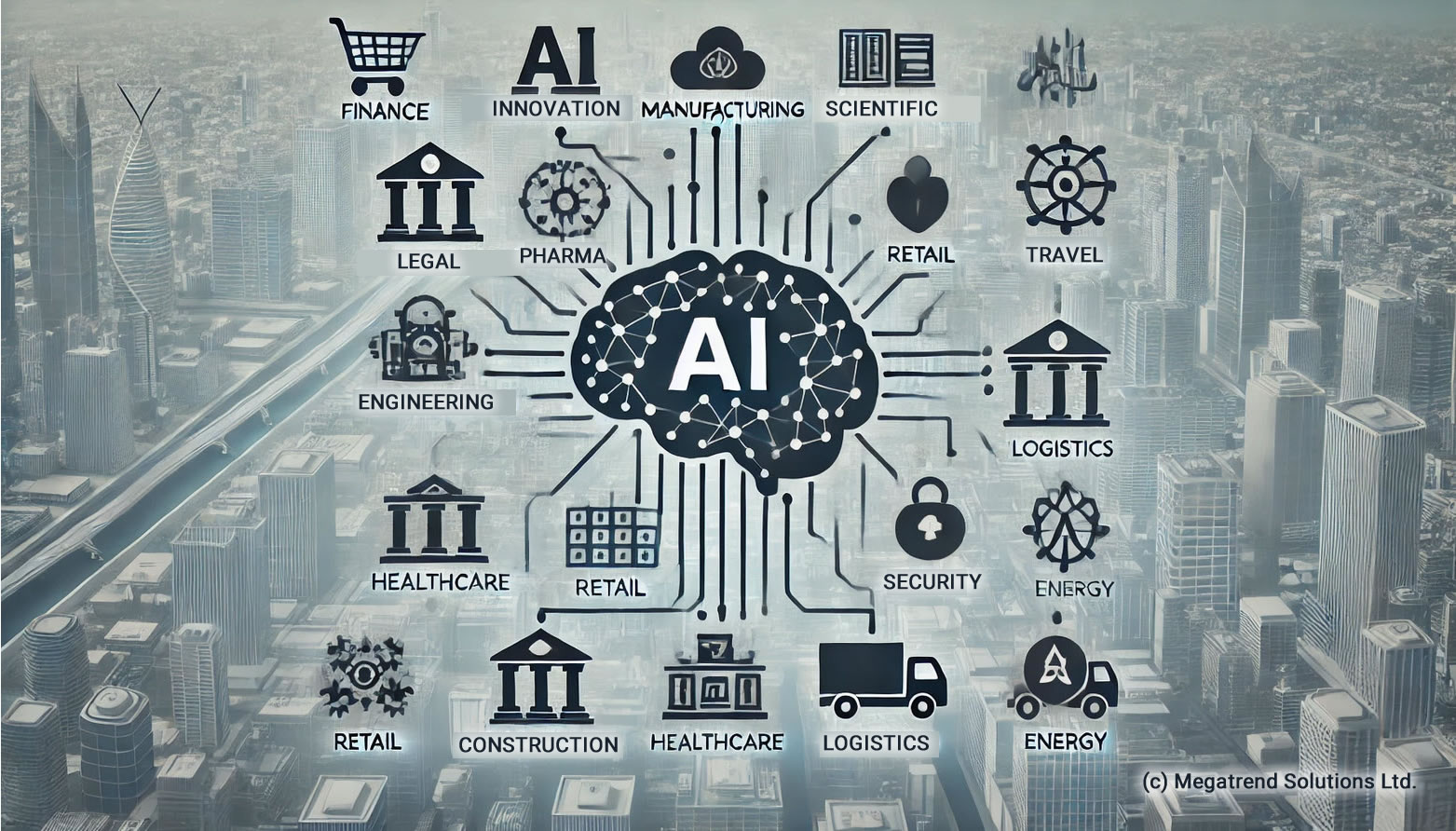In today’s fast-paced digital economy, businesses across a variety of sectors are turning to artificial intelligence (AI) to automate processes, enhance efficiency, and maintain a competitive edge. From manufacturing to finance, healthcare to retail, AI is not only transforming how businesses operate but also how they innovate. As AI continues to advance, its applications are becoming increasingly versatile, offering tailored solutions that meet the unique challenges of different industries. In this article, we will explore how AI is automating processes across diverse business sectors, highlighting the impact it is having on operations, productivity, and customer experiences.
1. Manufacturing
Manufacturing is one of the sectors where AI has made significant inroads, revolutionizing how products are designed, produced, and delivered. AI-driven automation in manufacturing extends from predictive maintenance to quality control and supply chain optimization.
Predictive Maintenance: Traditional maintenance practices often rely on scheduled checks or react to equipment failures. AI, however, enables predictive maintenance by analyzing data from sensors embedded in machinery. These AI systems can predict when a machine is likely to fail and recommend maintenance before a breakdown occurs, reducing downtime and saving costs.
Quality Control: AI-powered visual inspection systems are being used to detect defects in products with greater accuracy than human inspectors. By using machine learning algorithms to analyze images and identify inconsistencies, these systems ensure higher quality products and reduce waste.
Supply Chain Optimization: AI is also optimizing supply chains by forecasting demand more accurately and managing inventory levels in real-time. AI algorithms analyze historical data, market trends, and even weather patterns to predict demand, enabling manufacturers to adjust production schedules and reduce excess inventory.
2. FINANCE
The finance sector has been a frontrunner in adopting AI, leveraging its capabilities to enhance decision-making, improve customer service, and ensure regulatory compliance.
Fraud Detection: AI is playing a crucial role in fraud detection by monitoring transactions in real-time and identifying suspicious activities. Machine learning models can detect anomalies in transaction patterns that might indicate fraud, allowing financial institutions to take proactive measures to prevent losses.
Customer Service: AI-powered chatbots and virtual assistants are increasingly being used in the finance sector to handle customer inquiries, provide financial advice, and assist with transactions. These AI systems can understand and process natural language, offering a more personalized and efficient customer experience.
Risk Management: AI is enhancing risk management by analyzing vast amounts of data to identify potential risks in investment portfolios, loans, and other financial products. AI-driven models can assess credit risk, market risk, and operational risk with a high degree of accuracy, helping financial institutions make informed decisions.
3. Healthcare
In healthcare, AI is transforming patient care, diagnostics, and administrative processes, leading to better outcomes and more efficient operations.
Diagnostics: AI-powered diagnostic tools are helping doctors to identify diseases earlier and more accurately. For example, AI algorithms can analyze medical images, such as X-rays and MRIs, to detect conditions like cancer, heart disease, and neurological disorders, often with greater precision than human specialists.
Patient Care: AI is also enhancing patient care through personalized treatment plans. By analyzing patient data, AI systems can recommend treatment options that are tailored to an individual’s genetic makeup, medical history, and lifestyle, leading to more effective outcomes.
Administrative Automation: In the administrative sphere, AI is automating tasks such as appointment scheduling, billing, and medical record management. By streamlining these processes, healthcare providers can reduce administrative burdens, allowing them to focus more on patient care.
4. Retail
The retail sector is leveraging AI to enhance the shopping experience, optimize inventory management, and drive personalized marketing efforts.
Personalized Marketing: AI is transforming how retailers engage with customers by delivering personalized marketing messages and product recommendations. By analyzing customer behavior and preferences, AI systems can create targeted campaigns that resonate with individual shoppers, driving sales and improving customer loyalty.
Inventory Management: AI is also improving inventory management by predicting demand and automating restocking processes. AI algorithms analyze sales data, seasonal trends, and even social media activity to forecast demand, ensuring that retailers have the right products in the right quantities at the right time.
Customer Experience: AI-powered chatbots and virtual shopping assistants are becoming increasingly common in the retail sector. These AI tools help customers find products, answer questions, and even complete transactions, providing a seamless and personalized shopping experience.
4. Logistics and Supply Chain
In the logistics and supply chain sector, AI is driving efficiencies by automating route planning, demand forecasting, and warehouse operations.
Route Optimization: AI is being used to optimize delivery routes by analyzing traffic patterns, weather conditions, and delivery time windows. This not only reduces delivery times but also lowers fuel consumption and operational costs.
Demand Forecasting: AI algorithms are enhancing demand forecasting by analyzing historical data, market trends, and external factors such as economic indicators. This enables logistics companies to anticipate demand fluctuations and adjust their operations accordingly.
Warehouse Automation: AI is also automating warehouse operations through robotics and machine learning. AI-powered robots can sort, pick, and pack items more efficiently than human workers, reducing errors and speeding up the fulfillment process.
5. Energy
The energy sector is using AI to optimize power generation, reduce emissions, and improve grid management.
Smart Grids: AI is playing a crucial role in the development of smart grids, which are designed to efficiently manage the distribution of electricity. AI systems analyze data from sensors and meters to optimize energy distribution, reduce outages, and integrate renewable energy sources more effectively.
Predictive Maintenance: Similar to manufacturing, AI is being used in the energy sector for predictive maintenance of equipment such as turbines and solar panels. By predicting when equipment is likely to fail, energy companies can perform maintenance proactively, reducing downtime and extending the lifespan of their assets.
Energy Optimization: AI algorithms are also being used to optimize energy consumption in buildings and industrial processes. By analyzing energy usage patterns, AI can recommend adjustments to heating, cooling, and lighting systems, leading to significant energy savings.
6. Legal Services
In the legal sector, AI is automating routine tasks, enhancing legal research, and improving document management.
Document Review: AI is being used to automate the review of legal documents, such as contracts and agreements. AI-powered tools can identify key clauses, flag potential issues, and even suggest edits, reducing the time and effort required for document review.
Legal Research: AI is also enhancing legal research by quickly analyzing vast amounts of case law, statutes, and legal opinions. AI-powered research tools can provide lawyers with relevant information more efficiently, allowing them to build stronger cases and serve their clients better.
Case Management: In case management, AI is automating tasks such as scheduling, billing, and communication with clients. This allows legal professionals to focus on more complex tasks, improving overall efficiency and client satisfaction.
Conclusion
AI is reshaping industries across the board, offering automation solutions that enhance efficiency, reduce costs, and improve outcomes. From manufacturing to healthcare, retail to legal services, AI is not just a technological advancement—it is a fundamental shift in how businesses operate. As AI continues to evolve, its applications will become even more diverse and integral to the success of businesses in every sector. For companies looking to stay ahead in this rapidly changing landscape, embracing AI-driven automation is not just an option—it’s a necessity.
Ready to Explore How AI Can Transform Your Business?
Discover how AI can streamline your operations, enhance efficiency, and drive innovation across your industry. Contact Megatrend Solutions today for a personalized consultation and let us help you harness the power of AI to stay ahead in your market.
Take the First Step Towards Automation – Connect with Us Now!






